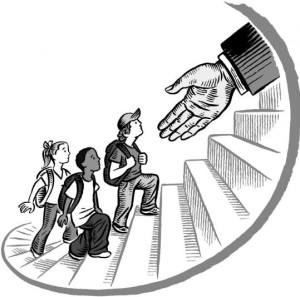 It’s easy to ascribe nefarious motives to those with whom we disagree. As I read headlines about school reform, I often find myself wondering if the reformers I am reading about are “white hat” reformers who truly care about the plight of poor children whose only hope for a better future will come through education, or if they’re “black hat” reformers who are really just trying to force a new investment bubble on the world by privatizing education.
It’s easy to ascribe nefarious motives to those with whom we disagree. As I read headlines about school reform, I often find myself wondering if the reformers I am reading about are “white hat” reformers who truly care about the plight of poor children whose only hope for a better future will come through education, or if they’re “black hat” reformers who are really just trying to force a new investment bubble on the world by privatizing education.
I have seen many fans of reform ridicule the notion of a “Billionaire Boys’ Club” actively conspiring to create a profit-based enterprise from what was once a service-based public good. Maybe they’re right and this idea is conspiratorial, but there’s no doubt that free-market educational approaches are all the rage. And then you see the list of hardcore reform donors: Michael Bloomberg, Bill Gates, the Walton gang, Broad, Dell, Whitney Tilson, Zuckerberg. I’ve read as reform defenders argued that these guys already have all the money they need, that their school reform efforts are strictly altruistic endeavors. They have looked across the American landscape, we are told, and they identified the education of poor children as one of our nation’s greatest crises, and they determined to use their vast wealth to make a difference.
I go back and forth in my mind about whether or not I believe that. I think probably the billionaires are “gray hats.” In other words, they are most likely quite honestly of the mind that public schools are failing horribly, an easy thing to believe 100% if you are sheltered from public school realities and have no personal connection to actual public schools, if you get your information about public education not via relationships with a typical public school’s real-life students and teachers but rather from one-sided reports, hyperbolic movies, and websites about school reform.
But the next step they are taking is quite evidently less-than-altruistic. There are many ways to respond to struggles in inner city schools that don’t involve cracking open a public trust and converting it into a new investment opportunity, a new bubble. These guys don’t ever seem to argue for increased education funding. They don’t ever attack inequity in education resourcing. They don’t push very hard for improved health care for students (except for the Gates Foundation, perhaps). When it comes to education, their solutions almost always devolve into the orthodoxy of less public investment and more profit opportunity.
Free market education is not the only way to save poor children in inner city schools; in fact, it’s not even a proven way. GSV Asset Management produced a 304-page document giddily lauding the lucrative possibilities in school reform (American Revolution 2.0, they call it) but was forced to admit things like “Stanford’s 2009 study of charter schools, called ‘the most comprehensive study ever done,’ concluded that 82% of charters perform either worse or no better than traditional public schools,” and “[fusion_builder_container hundred_percent=”yes” overflow=”visible”][fusion_builder_row][fusion_builder_column type=”1_1″ background_position=”left top” background_color=”” border_size=”” border_color=”” border_style=”solid” spacing=”yes” background_image=”” background_repeat=”no-repeat” padding=”” margin_top=”0px” margin_bottom=”0px” class=”” id=”” animation_type=”” animation_speed=”0.3″ animation_direction=”left” hide_on_mobile=”no” center_content=”no” min_height=”none”][a]] 2010 Vanderbilt University study showed definitively that merit pay for teachers does not produce higher test scores for students,” and “[a] National Research Council report confirmed multiple studies that show that standardized test scores do not measure student learning adequately,” and “[a]fter years of experimentation in large school systems such as New York and Chicago, Gates and Broad and others haven’t shown enough progress or new models for success to end the debate and scrap the old model.” These are the words of an enthusiastic promoter of these very reforms! They are saying, essentially, “Here are some magic pills. There’s no evidence they work; in fact, some major studies have suggested they don’t. We should sell lots and lots of them!” And yet the same report concludes that the people opposing all these things that don’t work have an “indefensible” position.
In other words, the billionaires pushing reform want to help poor American kids, and they want to make a little jack doing it. See, it’s not all bad. It’s only kind of smarmy and gross. But I can honestly say that when I went to Whitney Tilson’s blog wanting to hate the guy for being generally mean to teachers–my people–I actually came away, after reading about his many altruistic endeavors, thinking this is a kind-hearted if pushy guy–a bully with a heart for the weakest, neediest people on earth–a guy with a genuine passion for helping the less-fortunate, and the vast resources that allow him to actually make a difference. Sadly, I am by virtue of being a public school employee on the flattening end of his reform steamroller. I am on the receiving end of his many darts of disdain: not me personally, but my profession, my calling, my peers and colleagues who–and this is why I stay fired up all the time–ARE DAILY WORKING ON THE FRONT LINES OF POVERTY AND WHILE NOT PERFECT ARE NOT THE BAD GUYS.
Inequity is still the bad guy. And most galling of all–maybe they don’t realize it–the billionaires and millionaires of the business community are, and have always been, the architects and most ardent defenders of inequity in America. They have created and manned the turrets of our nation’s grossly inequitable distribution of power, esteem, capital, and opportunity.
They, not the teachers.
Does anyone believe that America’s bad teachers–whatever percentage of the whole population of teachers they are–have done more harm to poor and minority Americans than the skewed competitive social constructs that disproportionately reward the haves and their children and shunt aside the have-nots in America? I’m all for capitalism, but runaway capitalism that isn’t cut with policies protecting the disenfranchised and the powerless does real damage to our nation’s future. This is the broken foundation–rising, not falling, inequity; gaps getting wider, not narrower–that is causing our doors to stick and our teachers to fail. (Unfortunately, when our foundations falter, it’s cheaper and easier to take a belt sander to the bottom of the door than it is to jack up the foundation.)
My disagreement with the billionaire reformers is one of cause and effect. I think their preferred economic policies–the policies that helped them make a mint–created the environment that made a certain percentage of failing schools and failing teachers inevitable. They seem to think, conveniently, that lazy good-for-nothing middle class teachers who hate their students have caused our malaise.
I hate it in general when people point a finger at me and accuse me of being a bad person. But when the finger pointing at me is dripping with blood, I hate it even more.
Sometimes I think I’m probably too combative and that I shouldn’t throw so many elbows in my defense of public education. But then I think about the people I may be offending, and I think about the headlines of the things they’ve written: “Public Schools Aren’t Broke, Only Broken,” “Wake Up, Our Schools Are Failing”. Things like that . There isn’t much nuance there. There is only this reckless stereotype that picks the worst data out there–and there will always be data in our ocean of it that one can use to suggest a crisis–always–and concludes that things are “worse than they’ve ever been” in public education. And that is demonstrably false in terms of college-going rates, in terms of SAT participation rates, in terms of rising scores and AP participation, etc., etc.
So the battle lines remain. I don’t think the reformers are all conspirators–but I also don’t believe Rupert Murdoch and Wireless Generation got into school reform because they want to help the poor.
I guess what I’m trying to say here is this:
There’s gold in that that philanthropy!
If you enjoyed reading this article by John Kuhn, don’t forget to register for our annual conference where he will be the Keynote Speaker! [/fusion_builder_column][/fusion_builder_row][/fusion_builder_container]




Brilliant, insightful, balanced and well-spoken, as usual. Thanks for being a strong voice for those of us who understand that educational problems aren't as bad as the hype suggests and that they won't ever be fixed by measuring kids and hating teachers.